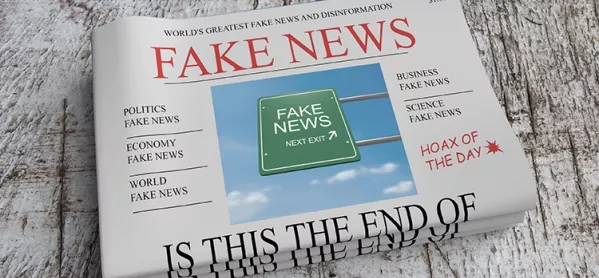- Home
- Pupils ‘lack literacy skills to spot fake news’
Pupils ‘lack literacy skills to spot fake news’

Only 2 per cent of children and young people can tell if a news story is real or fake, according to a survey published today.
More than half of teachers (53.5 per cent) felt the national curriculum was failing to equip children with the literacy skills they need to identify fake news, according to the joint report from the All-Party Parliamentary Group on Literacy and the National Literacy Trust.
And 61 per cent of teachers said fake news was increasing fear and anxiety among young people,
The report states that while the online world is a “constant, convenient” source of information, children lack the knowledge and skills needed to assess how reliable online information is.
“I’ve seen the impact first hand in the classroom of fake news turning fiction into fact and creating real panic and anxiety sometimes,” Jessica Theisinger, literacy co-ordinator at Claycots School in Slough, Berkshire, told the report’s authors. “Debunking stories such as killer clowns can be difficult when there’s fear attached to it.”
The report shows that of the 2,220 pupils who took a quiz showing two fake and four real news stories, only 1.9 per cent identified all six news stories correctly as either fake or real.
Primary pupils were five times more likely than secondary pupils to identify all the stories correctly (3.1 per cent of primary pupils compared with 0.6 per cent of secondary).
When looking at who had spotted both the fake news stories, 52.8 per cent of primary and 25.6 per cent of secondary pupils did so.
And disadvantaged children were less likely to correctly identify the two fake news stories than their classmates, the report found.
‘Threat to wellbeing’
The report calls for urgent action from the government to make critical literacy skills - such as challenging what one reads, thinking about what the source is and knowing the difference between fact and opinion - more explicit in assessments at the end of primary and secondary school.
And it also suggests that children are given a regular time to read, hear and see current news stories in school - for example during personal, social, health and economic education (PSHE).
The report points out that there are close links between an individual’s literacy skills and their ability to be an active and informed citizen.
“We have uncovered a dangerous lack in the literacy skills that children and young people require to navigate our digital world and identify fake news,” Jonathan Douglas, director of the National Literacy Trust, said.
“If we don’t take urgent action to bring the teaching of critical literacy skills into the 21st century and to engage children actively with news, we risk damaging young people’s democratic futures, along with the wellbeing of an entire generation.”
Headteachers said that time for discussing subjects such as fake news should be protected by making PSHE statutory.
Nick Brook, deputy general secretary of school leaders’ union NAHT, said: “Yes, we need to teach grammar and spelling, but we also need to instil a thirst for knowledge, a love of reading and the critical literacy skills that enable young people to make informed decisions as to what to believe and what to ignore.
“The rigidity of the curriculum and testing regime work against this. High-stakes accountability can force schools to focus on teaching only what will be tested, as that is what they are measured on. NAHT support the call for greater flexibility to enable schools to properly equip young people with skills appropriate for the future, not the past.
“We’d also like to see protected curriculum space for non-exam subjects, like PSHE.”
A Department for Education spokesperson said: “Teaching should equip pupils to ask perceptive questions, think critically, weigh evidence, sift arguments, and develop perspective and judgement.
“Pupils should also be taught through citizenship education, a compulsory part of the national curriculum at key stage 3 and 4, to distinguish fact from opinion as well as exploring freedom of speech and the role and responsibility of the media in informing public opinion. Through history in key stage 3 and 4, pupils are taught to understand how to interrogate sources and understand how context can influence arguments. Schools are also free to teach children about media, advertising and safe use of social media through PSHE.”
Keep reading for just £1 per month
You've reached your limit of free articles this month. Subscribe for £1 per month for three months and get:
- Unlimited access to all Tes magazine content
- Exclusive subscriber-only stories
- Award-winning email newsletters



